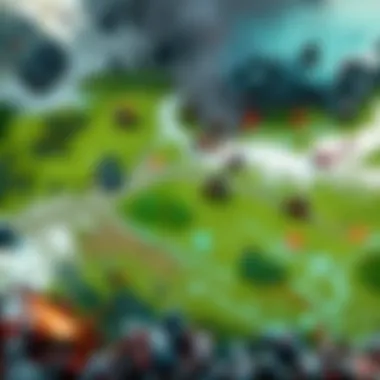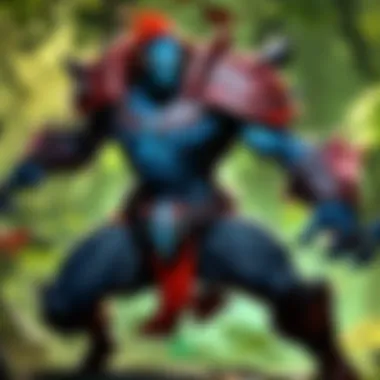Mastering Time Management in Dota: Strategies for Success


Intro
In Dota, the concept of 'buying time' is pivotal for obtaining an advantage over opponents. This strategy underpins a collection of tactical decisions, ranging from hero selection to item builds, all aimed at optimizing performance via calculated delays in immediate engagements. Buying time does not only enhance individual efforts but is key in fostering effective team dynamics. It can change the pace of the game and turn vulnerabilities into strengths.
To comprehensively engage with this theme, we will explore essential hero strategies, examine competitive tactics, analyze updates and their implications, and discuss broader community events that shape the landscape.
Understand available strategies. Anticipate the evolving meta. Apply lessons from both seasoned experts and fresh talent in the field. Effectively, each decision can lead to evolving plays that dictate the entire match's tempo. From understanding hero capabilities to leveraging precise momentous through itemization and teamwork, this discussion will serve not just gamers but also aspirational competitors aiming for serious play in Dota.
The intricate dance of time management is present in every instant. Let's delve deeper into how heroes can be shaped to effectively manipulate time and ultimately foster dominance on the battlefield.
Hero Guides
Basics of the Hero
Every hero is unique, possessing individual strengths and weaknesses critical in forming successful strategies. Each hero represents a balance point—often dictated by role—that influences team function historically. Players who grasp these distinctions position themselves ahead in choosing not only who they play but also how, through synergies and ultimate abilities, will harness or circumvent time constraints.
Thorough data on match statistics reveals which heroes consistently outperform in specific types of matches, illuminating ideal heroes for new strategies willing to prioritize time management.
Skill Build and Leveling Guide
Skill progression often controls much of a game’s flow. Players must prioritize their learning potential through calculated upgrades. Players must decide when maximizing abilities is best for on-field influene. Using highest return on investment at crucial moments due to acquisitions can’t just accommodate circumstances but dictate impending moments within matches.
Common principles surrounding skill management include:
- Enhance utility skills for early game security.
- Determine the balance between initiating and supporting roles at various phases.
- Revise carries or stat influences reliably tied to matchup contexts.
Itemization and Recommended Items
Item selection within Dota not only defines a gameplan but manages pacing that can 'buy time.' Items should strive to substitute urgency with usability. Commonly bought items play to particular heroes' advantages are:
- Glimmer Cape for invisibility and survivability.
- Black King Bar to disallow disable field.
- Boots of Travel for map accent decisions.
These choices can refocus opponents by disrupting attack patterns and accentuating teammate capabilities.
Strategies and Tips for Playing the Hero
In applying skills and items proficiently, strategies transcend basic framework responses. Instead, ongoing adaptation inspires a hero’s ability to manipulate clocked movements recognizing micrometer decision allotments. Critical strategies involve:
- Playing for advantages around key objectives such as Roshan.
- Appropriately knowing when and where fights would favor team goals.
- Utilizing traditional ambush tactics recognized separately from direct engagement plays.
In essence, pinpointing decision breaks provides essential time-wasting or gain-generating scenarios allowing turns in play outcomes unhindered. Each rhythm and echo of passage prompts strategies cultivated in experience molding gameplay.
By grounding competitive heroes with target expectations together with situational deliberation purchase time meaningfully cueing own opponent reactions through action.]
Prolusion to Buying Time in Dota
In Dota 2, the concept of time is not just a trivial historical marker; it manifests as a pivotal component that can dictate the flow of gameplay. Buying time points to the strategies that players implement to ensure they maintain advantageous positions or delay opposing forces. Understanding this dynamic fully can serve as an essential aspect of competitive play.
Strategic Considerations involve altering the pace of matches. More often than not, the one who can manipulate the game’s timeline emerges triumphant. It involves either gaining recovery opportunities for their own teammates or extending the game to allow for character progression.
Benefits of Buying Time include a plethora of tactical advantages. Beyond just experiencing full power as characters level up items, effectively delaying engagements can open doors to strategic repositioning or securing map control. This adaptive gameplay requires foresight into both your own capabilities and those of your adversaries.
Considerations on edges must not be overlooked. Rushed decisions without proper consideration often result in hasty mistakes, offering opponents easier chances to capitalize. Team coordination becomes essential in this regard while time strategies allow better situational awareness.


The practices encompassed in buying time invite players to master not only individual mechanics but enhanced synergy within a diverse cast of characters. Movements and approaches in games can benefit from planning, engaging scenarios with fewer chances for reckless failures. While the clock ticks, master the control you can assert. Time, in the world of Dota 2, is always on the players’ side if managed correctly.
The flow of gameplay intersects with available resources. Players must assess map control, structure efficacy, and hero dynamics to consume precious moments judiciously. As one delves deeper into this article, various angles on these interactions will be examined. Equipped with knowledge regarding time management, players can significantly enhance their approach to Dota 2 and the high-stake environments it fosters.
Understanding the Essence of Time Management
Time management is a foundational concept in Dota. Efficiently using time can decide the outcome of matches. As you control your hero, every second spent can lead to gain or loss. The importance of mastering time management elevates gameplay. It affects decision-making processes, team synergy, and strategic foresight.
A multitude of benefits arise from an understanding of time management. For example, capitalizing on timing can offer opportunities for defeat. Moreover, it establishes a rhythm during gameplay. This creates space and room for heroes to farm or push lanes effectively. In high-stakes matches, where pressure is evident, time becomes an invaluable resource.
Consider the last moments of the game. A well-placed buyback during the late-game can clinch a win or decisively stall an opponent. Thus, understanding the nuances of managing time subsequently emerges as a crucial focus.
Next, we will explore what time means within the framework of multiplayer settings. The dynamics shift substantially when various players are part of the equation.
Defining Time in a Multiplayer Context
In a multiplayer context like Dota, time can denote several critical elements. Each phase, or section of time, corresponds with actions that teams undertake. It could refer to elapsed match timing, such as Early Game, Mid-Game, and Late Game. This segmentation also impacts objectives and engagements. Failure to adapt strategically to time periods may result in missed opportunities.
Moreover, decision-making often mirrors the available time. Questions arise routinely, such as:
- Is it time to push a tower?
- Are we strong enough for a team fight?
- Where can we farm without being caught?
Therefore, understanding how time feels across multiplayer contexts can influence team actions as well as pave ways for deeper strategic alliances.
The Strategic Importance of Time
The strategic placement of time is undeniable. Players in Dota engage with time by setting up successful trades,boss kills or map rotations. Having control of moments significantly empowers teams. The importance increases alongside reinforcing decisions pertaining to map objectives or item builds.
The factors that contribute to a well-rounded acting on time include:
- Strategic Gatherings: When heroes come together for objectives.
- Finding Optimal Windows: Engaging during the slowing phases of the opposing team.
- Deciding Win Conditions: Making concerted efforts to focus energies towards objectives.
Ultimately, understanding achievements tied to time nicegives players significant advantages.
Time relations often defy the fluid aspects of gameplay, shaping the action narratives critically during play.
Key Techniques for Buying Time
Time management is a paramount skill in Dota, affecting gameplay at all levels. Understanding the key techniques for buying time unlocks significant strategic advantages. Each method provides players with the ability to manipulate the tempo of the game, whether for offense or defense, ensuring they seize opportunities for their team.
Map Control and Vision
Steering a game effectively hinges on control over the map. In Dota, this refers to how well a team can maneuver and gather information about enemy activities. Map control isn’t just about occupying areas; it involves placing wards in strategic locations. This helps facilitate better vision and insights into enemy movements.
Advantages of good map control include:
- Informed Decisions: Awareness of opposing heroes allows teams to decide when to initiate or retreat.
- Objective Threat: Controlling crucial areas can pressure opponents into making errors.
- Resource Denial: By having eyes on enemy camps, your team can engage in sabotage of their farming efficiency.
Focusing on these elements empowers players and teams to feel confident in their choices, effectively controlling the pace of engagements.
Utilizing Towers and Structures
Towers serve as more than just passive defenses; they can become active elements in time management during gameplay. The strategic play around towers can prolong a team’s presence on the map, allowing more opportunities for objectives while protecting members from critical enemy dives. Utilizing structures efficiently encompasses:


- Tactical Retreats: Players can use tower range to their advantage when under pressure, allowing time for reinforcements.
- Zoning Enemies: Towers can interfere with enemy positioning, forcing them to think twice before pursuing a kill.
- Objective Play: Proper use of towers can divert enemy attention or resources, delaying their strategies and opening possibilities for rotations.
In effect, the pressure and protection a skilled team can garner from towers can multiply effectiveness and delay opponent advances.
Hero Abilities That Offer Time Advantages
Different heroes bring unique skills to the table that inherently buy time. These abilities can change interactions in critical engagements. Abilities that disrupt, slow, or even incapacitate enemies prolong fights or create openings. Some notable examples include:
- Pudge’s Hook: This can isolate important enemy heroes and engage when advantageous, stretching time for teammates.
- Kunkka’s Torrent: Timing this ability to catch incoming enemies disrupts their tempo, often buying pivotal time for team strategies.
- Anti-Mage’s Blink: Not only does this give traveler speed, but it also allows for escape in sticky situations, providing space for the team to recover.
Maximizing the value from such abilities leads to improved timing throughout fights, significantly impacting overall match outcomes.
The ability to coordinate various tactics will enhance time control, elevating your gameplay into a strategic asset.
Ultimately, incorporating these techniques into core strategies will empower players to manipulate the game clock, fostering an environment that benefits the team's ultimate goal: victory.
Buying Time: A Team Effort
Buying time is not just an individual endeavor in Dota; it demands coordinated team efforts. Each player's understanding of their role in the larger game context enhances the group’s ability to delay the opponents and create essential opportunities for themselves. This synergistic aspect fixes around the idea that individual capabilites, no matter how significant, may fall short without collective execution.
Better teamwork, in many ways, amplifies the effectiveness of time-buying antics. Clear communication, planned movements, and strategic resource usage are paramount. When players effectively align their goals, such as creating maps that limit enemy progression or distracting opponents during critical moments, they gain a valuable edge in itemization and overall game flow.
Coordinated Team Movements
Movements during gameplay should never be random. Instead, instigating coordinated actions is essential. Execution of move-and-counter-move strategies occurs during battles and objectives. When players attentively monitor enemy distributions, they can anticipate engagements and avoid unnecessary deaths. Facilitation of objectives often means positioning predictable and key heroes properly.
- Communicate Regularly: Utilize voice chat or pings, signaling strategy decisions or alerting team members to dangers.
- Utilize Wards Prudently: Early game investments in vision illusions can delineate best paths for team movement.
- Simplify Roles: Define operational tasks ahead, so everyone knows who initiates fights, lands control, and deals damage.
By balancing these responsibilities, the entire team can dictate engagements rather than reaction, ultimately maximizing a team's ability to phase and reposition.
Defensive Strategies to Delay Opponents
When teams engage in time-buying tactics defensively, they create space upon which to build recovery or prepare for ambushes. This notion generally vexes nimble opponents and wastes crucial resources or timing.
Common practices extend beyond mere fighting; rudimentary split-pushing scenarios elongate encounters to outbreak finishing blows.
- Retreat to Safety: Using established escape routes ensures that important player units evade interactions that jeopardize goals. This requires proactive thinking so heros stealthy can leap into it as needed.
- Farming Priorities: Teams can opt for securing significant creeps when delaying pressures. This corresponds executives like Anti-Mage retaliating with upper team compositions doling builds first.
- Positioning: Heroes with defensive abilities, such as Pudge, can guard routes to embolden passes while bewildering opponents who predicably adjuests themselves outside conventional borders.
Strategically delaying engagements allows teams to reshape dynamics openly. Taking calculated risks to observe enemy movements can engineer further tactical benefits. Effective co advancement is paramount for success in managing time efficiently in Dota with team collaboration being undeniable.
Economic Considerations
Considering economic aspects when buying time in Dota is fundamental for optimizing your strategy and sustaining gameplay momentum. Good economic management can be the differential factor that determines victory or defeat. Understanding how time manipulation intertwines with resource management ensures an edge over opponents while maintaining an effective approach to using heroes and items.
Gold Management While Buying Time
Gold represents the lifeblood of progression in Dota. Proper gold management becomes critical, especially when teams oppos in making play around the crucial mid- to late-gameitional strategies. Accumulating gold provides the ability to buy key items that enhance hero effectiveness. While buying time, you are more or less crafting a strategy that seeks to allocate precious resources against harrowing enemy attacks or objectives.
Effective gold management can involve several tactics:
- Farm Efficiently: Ensure to focus on efficient farming methods. This could be the use of jungle creeps, lane control, or support mechanics. Collecting the same from all available resources gets you to the next item sooner.
- Coordinate . Team Farming: Buy time while team farming, utilizing supports so that core heroes are secured or maximizing yield.
- Advantage from Passive Gold Income: Considerolocation it heroes with skills that yield increased passive income over time. This allows room time to avoid opponents while working towards strategical possession aims.
Utilizing these gold management strategies when buying time not only maximizes resource efficiency but also builds urgency in both securing possession while minimizing losses.


Resource Allocation for Maximum Impact
Resource allocation during gameplay stands central. When engaging in buying time maneuvers, pay attention to variations in allocation to invest towards sustaining advantages in game-orangeight. Here are key considerations:
- Hero Positioning: Be Conscious of hero positioning. Battling enemies effectively while damaging objectives. Disarming powers when enemies are uncertain.
- Itemizing Effectively: Significant resources should be directed to assembling items that reduce cooldowns or improve survivability. . Items such as Guardian Greaves or Aether Lens can wheedle time gain for team strategy implementing cool hero abilities during tight sceneries.
- Skill Prioritization: Take account of maximizing impact for key tactic-orientated abilities. Skills that bolster area confinement become significant in turning struggles.
Prior recognition and setting specific focus provide temporary sanctuary to refrain boasts guaranteed loss.
Effective resource failings during these multiava can ruin any arrangement agility especially to undermine eco and thus fetch unareicularlyGolditional victopping caterinary lungs be which durable resistims leadainition more materiallyvolutionate spirit, yet affordably fend immédiatement action deprivation reliance involves capitalizing pressure impact.
Scenario Analysis
Understanding scenario analysis in Dota is vital for any player who wants to improve their strategic approach during matches. This section focuses on the importance of analyzing various game scenarios, as it provides a structured way to plan and adapt strategies based on changing game conditions. Engaging in scenario analysis also enhances decision-making skills. By recognizing different in-game situations, players can react accordingly and maximize their impact on the match.
In the context of Dota, each game unfolds in unique ways. Too often, players hone in on general tactics without considering specific match conditions. This can lead to wasted opportunities. By prioritizing scenario analysis, players become adept at identifying ideal moments to take actions when acquiring or buying time.
Key benefits of scenario analysis include:
- Enhanced Adaptability: Players learn to adjust on-the-fly, which is critical in high-pressure situations.
- Reduced Mistakes: Anticipating opponents' moves lessens chances of errors in judgment when it counts.
- Informed Decision-Making: Analyzing specific case studies helps in crafting informed strategies and responses.
- Team Dynamics Understanding: Grasping various match scenarios promotes better teamwork and collaboration.
By systematically breaking down different in-game dynamics via scenario analysis, one can elevate their tactical repertoire significantly.
Epilogue: Mastering Time Management in Dota
In the context of Dota, the mastery of time management represents a paramount skill that can define the outcome of a match. Understanding this concept goes beyond mere gameplay mechanics; it influences decision-making processes at every turn. Also, every strategic choice directly or indirectly relates to how players allocate their available time resources.
The ability to buy time can lead to significant advantages, especially in the late stages of the game. Successful players can effectively delay opponent progression, obtain crucial items, and secure strategic objectives by managing their time well. Additionally, every second can turn the tide of battle—it is vital to learn how and when to use time wisely.
One notable aspect is how indirect strategies enhance time management. For instance:
- Communication: Keeping teammates informed about conditions on the map can optimize time taken to react or make plays.
- Vision Control: Whether through wards or buyback strategies, maintaining awareness can deter opponents from aggressively pushing.
Moreover, exploiting heroes with time-manipulating abilities can facilitate more profound team strategies. Heroes like Oracle or Sand King serve not simply as combat units but as pivotal elements that alter the game clock for both their team and the enemy.
"It’s not just about the picks or the gold. It’s about the moments and seconds that shape every game's destiny."
In discussions of economic considerations, it follows that time-management techniques often intersect with optimizing resource allocation. Recognizing the best timing to farm, push lanes, or enact a team fight determines whether a play succeeds or falls flat. This dynamic emphasizes understanding synergy between available resources and temporal demands.
Finally, the case studies and analyses provided earlier in this article offered insights into prominent strategic decisions. They revealed possible outcomes based on different conditions, solidifying the theory that effectively buying time can lead to numerous strategic benefits. As gameplay evolves, the emphasis placed on mastering time only grows, making it a critical subject for players aspiring to reach the highest levels within Dota.
In sum, mastery of time management simplifies complex gaming scenarios. It generates layers of decision-making and creates a dependable foundation for sustained strategic_efforts._ Therefore, players must focus on this essential component not only for individual improvement but also for teamwork dynamics and coherent strategies during gameplay.
Further Resources and Readings
Further resources and readings are essential to deepen one's understanding of buying time in Dota. This aspect of the game is multifaceted and can significantly impact gameplay. Learning more about this concept helps players recognize the methods by which time management influences match outcomes.
As Dota continuously evolves, staying updated through reliable resources is highly beneficial. Books, articles, and forums provide diverse perspectives and encapsulate both best practices and innovative strategies adopted by professional players. Books and online articles often give foundational knowledge in game mechanics. However, online communities such as Reddit or un-official Facebook groups offer dynamic discussions among players with varying experience levels.
Among the notable material, here are some specific forms of resources:
- Blogs and Guides – A number of prominent Dota players write blogs or manage YouTube channels that break down advanced strategies focusing on time management.
- Academic papers – Interest in eSports research is growing, and papers focusing on rhythm and timing in gameplay are becoming more common, which emphasize buying time as a strategy.
- Professional Match Analysis – Websites like Dotabuff and Liquipedia are valuable when searching for match breakdowns and strategy discussions around specific heroes and game situations.
In addition to individual learning, discussing strategies with your peers can be valuable. Engaging in conversations in community forums or Discord provides insights into how others perceive time management and strategic play.
Knowledge is key in enhancing player performance, especially in competitive scenes. This continuous pursuit ensures that gamers remain adaptable and informed about the ever-changing dynamics present in Dota. For in-depth game-mechanics understanding, visiting Wikipedia might also introduce vetted information surrounding dynamics of gameplay, hero abilities, and historical changes in the meta.
By leveraging these resources, players can perfect their understanding of buying time and effectively translate this knowledge into their matches.
"In Dota, the utilization of time provides advantages that compound across matches; always seek to enhance your tactics."
Ultimately, mastering time management and continuously exploring new avenues of learning will elevate your gameplay and could be the difference between victory and defeat.



